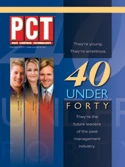Pest management professionals have a lot to be optimistic about. Just a few considerations include an economy on the upswing; better, more effective products; receptive customers; and of course the continuing presence of pests themselves.
PCT’s 2003 survey confirms that PCOs are encouraged by the direction the industry is heading. About 90 percent of PCOs said they were very or somewhat optimistic about the future of the pest control industry.
"I’m very optimistic about the future of our industry because people in our society will give up a lot before they’ll accept pests in their homes and businesses," said Michael Katz, president of Western Exterminator Company, Anaheim, Calif. "The need for our services isn’t going to go away."
But while pest management professionals are mostly optimistic, there’s still a sense that the events of 9/11 have had a lingering impact on the business confidence of many pest management professionals. The majority of companies (63 percent) still expect to see an increase in sales by the end of the year. But this is down slightly from the close to 70 percent of companies who expected an increase in 2001. (That survey was conducted prior to 9/11.) The average sales increase expected is also slightly lower, at 15 percent, compared to 18 percent in 2001.
BIG BROTHER. When asked what represented the most serious threat to the future of the industry, government regulation was most frequently selected, chosen by about 65 percent of survey respondents. The second-most named threat was a lack of qualified labor, selected by 13 percent of the respondents.
Richard Kramer, technical director of American Pest Management, Takoma Park, Md., and contributing technical editor to PCT, says while there aren’t many government regulatory issues to be concerned about at present, pest management professionals should keep their eyes open for local grass-roots efforts that would affect the industry. "My concern is more environmental activism that has led to shutting down things like mosquito abatement programs," said Kramer. "Those efforts eventually lead to being models for future legislation," he says, "and they’re not the type of model that I would like to see or I think the industry would like to see as a whole, because they’re not founded in science." Furthermore, Kramer says, these types of grass-roots efforts can be difficult to defeat.
Tim Hulett, president of Hulett Environmental Services, based in Riviera Beach, Fla., points out government regulation will always be part of the industry, but that makes legislative involvement all the more crucial. "It’s incumbent on the industry to police ourselves to ensure responsible legislation," said Hulett, "and also to police the government so they don’t produce some unworkable legislation that’s prohibitive to companies from taking care of customers."
Jeff Ledford, owner of 1st Choice Pest Services, based in Wichita, Kan., believes the industry will face some challenges competing with the do-it-yourself market. "I’m seeing more and more things available over the counter and I’m hearing customers say, ‘What can you do that I can’t buy,’" says Ledford. "I think the challenge of the industry is going to be to market our experience and knowledge and training, not our products."
To stay competitive in the industry, he says PCOs should differentiate themselves. "Don’t shy away from opportunities to set yourself apart from the crowd," Ledford says. "Stay competitive by being different and not being afraid to take the lead in different areas."
NEW PRODUCTS. However, other PCOs feel that new products available to the industry are making a difference. "I see the industry advancing with better products and services," says Jeff Johnson of A-Active Termite & Pest Control, Virginia Beach, Va. "I see our job eventually getting easier than what it is right now." He referred to such tools as management software, automated termite monitoring and better cockroach and ant baits, which have all recently become available. "I’m probably more excited about this industry now than I’ve been in 15 years."
And Western’s Katz notes in this fast-paced world, consumers demand instant gratification. "Our industry continues to have tremendous potential for growth, but only for those companies that understand the demands posed by today’s consumers," said Katz. "To grow, to succeed and to stay competitive, companies have to meet these demands right from the start. Today’s consumer isn’t going to give too many second chances, so it’s critical to understand the customer’s needs and satisfy them consistently from the first opportunity." PCT

Explore the October 2003 Issue
Check out more from this issue and find your next story to read.
Latest from Pest Control Technology
- Donny Oswalt Shares What Makes Termites a 'Tricky' Pest
- Study Finds Fecal Tests Can Reveal Active Termite Infestations
- Peachtree Pest Control Partners with Local Nonprofits to Fight Food Insecurity
- Allergy Technologies, PHA Expand ATAHC Complete Program to Protect 8,500 Homes
- Housecall Pro Hosts '25 Winter Summit Featuring Mike Rowe
- Advanced Education
- Spotted Lanternflies, BMSBs Most Problematic Invasive Pests, Poll Finds
- Ecolab Acquires Guardian Pest Solutions





